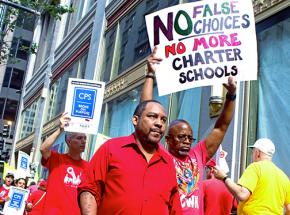Resisting a manufactured crisis
A Chicago Public Schools teacher reports on the latest developments in the battle to defend a quality public education for the city's students.
SOME 400 teachers and their supporters gathered for a protest of the July 22 Chicago Board of Education (BoE) meeting and the endless string of budget cuts being forced on the teachers, students and parents of Chicago. Participants included members of the Chicago Teachers Union (CTU), Communities United, North Side Action for Justice and many students, including a group from Kennedy High School on the Southwest Side.
The picket nearly enclosed the building on three sides. Considering that many teachers are away for summer vacation, the turnout was impressive, and the mood was upbeat and energized. The picket came on the heels of a rally last week by parents against recently announced cuts in budgets for individual schools.
This latest round of cuts is taking place against the backdrop of contract negotiations between the CTU and the BoE. Our contract expired June 30, and on July 1, the BoE announced $200 million in budget cuts and 1,400 layoffs. In contract negotiations, the board is demanding hundreds of millions of dollars in concessions from the CTU.

In response, the CTU has spearheaded a campaign that exposes how the mayor, the City Council and school officials have underfunded both the operating budget of the schools and the teachers' pension fund, rendering CPS "broke on purpose," as the teachers union puts it. Now, Emanuel and the BoE are seeking to take advantage of the crisis to reward their friends in the business community while punishing their enemies--chiefly the CTU.
Early last month, as the school year was ending, the CTU's contract campaign was on full display as thousands of red-shirted teachers and their supporters took over LaSalle Street on June 9, marching on the Mercantile Exchange in downtown Chicago.
The July 22 BoE meeting was the first of the newly reconstituted board. Because Mayor Rahm Emanuel appoints the Chicago Board of Education, he can stack it with his handpicked appointees whenever he wants. The new appointees are not much different from the ones they replaced--each one has some kind of institutional and/or business connection with the charter school "movement."
Despite rapid turnover in its CEO position, Emanuel's appointments continue to draw from the same crowd of corporate education reformers dedicated to advancing the vision of privatization--and attacking the working conditions and compensation of teachers and paraprofessionals.
Former CPS CEO Barbara Byrd-Bennett officially resigned June 1 several weeks after the FBI raided her home looking for evidence that she accepted kickbacks from her former employer SUPES Academy in exchange for directing a $21.5 million no-bid contract to the company. CPS Vice President Jesse Ruiz was rushed into her position, and Forrest Claypool, who had been serving as Mayor Emanuel's chief of staff, has now replaced Ruiz. The new BoE president, Frank Clark, was a major architect of the mass school closings of 2014.
ONE OF the new board's first orders of business was to discuss issuing $1.2 billion in bonds in order to generate enough cash to start the school year on time. But because the board was concerned about conducting such "sensitive" business in a transparent way, it convened a special "unpublicized" meeting before the regular meeting, where it voted unanimously to approve the bond issue.
"It's akin to not being able to make your grocery bills and utility bills, so you put them on your mortgage," CTU Vice President Jesse Sharkey said of the plan. "The problem, of course, is that you'll pay your grocery bills, but you could lose your home."
The union has, for many years now, been pointing to solutions for increasing revenue to cover shortfalls--like reform of the Tax Increment Financing (TIF) system that gives the mayor control over a personal slush fund of development funds and renegotiating CPS' toxic bank deals that have cost the school district tens of millions of dollars.
Instead, the BoE continues to pursue policies that seem intentionally designed to worsen the crisis in funding for public schools, while channeling more resources to banks and privatizers. Individual school budgets, for example, were just released last week. Normally, schools would have received their budgets last spring, but due to the crisis, everybody has been left hanging. The final budget has to be approved in August.
According to these individual school budgets, $60 million will be cut from neighborhood schools, while an additional $30 million in funding will go to charter schools. CPS claims this is because of a drop in public school enrollment and an increase in charter school enrollment.
However, the math doesn't add up, according to parents from the Common Sense Coalition of Local School Councils. Individual school budgets are based on student enrollment, with schools receiving between $4,697 and $5,444 per student, depending on grade level.
For a projected loss of six students, though, Logandale Middle School faces a budget cut of $248,048--which amounts to $41,341 per student projected to leave! Darwin Elementary School lost roughly $200,000 for a decline of three students. Kennedy High School lost $393,000 in special education funding for only three fewer students with disabilities. Meanwhile, additional money is being funneled into charter schools.
The response to these cuts in the middle of the summer--from teachers, students, parents and even principals--shows the great potential for the CTU to link arms with the broader community during the next school year in the fight for a just Chicago, backed by the muscle of a 30,000-strong union.
As teachers return to work this fall, it will be essential to build on the summer's momentum to crank up the heat on CPS and city officials to win justice for teachers and a quality education for the students they serve.


